Ecotourism and Conservation:
When we travel, we must think about how we affect the environment. Nature is a precious resource that we must protect for the future. The rise of sustainable travel has made people more interested in ecotourism. This approach to travel aims to reduce harm to the environment.
Travelers can help conserve natural habitats and support local economies by being eco-friendly. The goal of ecotourism is to enjoy nature while also protecting it. Let’s look at how we can positively impact the environment through travel.
Key Takeaways
- Understanding the principles of ecotourism
- The importance of sustainable travel practices
- Ways to minimize environmental impact while traveling
- Promoting local economies through responsible travel
- Conserving natural habitats for future generations
Understanding Ecotourism
Ecotourism is about responsible travel that helps protect nature. It’s a way to visit natural spots, keep the environment safe, and help local communities thrive.
What is Ecotourism?
Ecotourism means traveling to nature spots in a way that’s good for the planet. It’s about more than just seeing sights. It’s about protecting nature and helping local people too.
Principles of Ecotourism
Ecotourism has a few main ideas:
- Protecting the environment
- Helping local communities
- Learning and sharing knowledge
- Traveling in a responsible way
These ideas make ecotourism different from other kinds of travel. It’s about caring for nature and helping people, not just seeing places.
| Principle | Description | Benefit |
|---|---|---|
| Conservation | Protecting natural habitats and biodiversity | Preserves ecosystems for future generations |
| Sustainability | Supporting local economies and communities | Enhances the well-being of local populations |
| Education | Promoting understanding and appreciation of nature | Fosters a culture of environmental stewardship |
By following these principles, ecotourism can lead to eco-friendly adventures. It helps protect nature and supports local communities.
The Importance of Conservation
Conservation is key to keeping ecosystems healthy and diverse. Human actions harm the environment, making conservation more urgent than ever.
Why Conservation Matters
Conservation keeps our planet healthy. It protects habitats, preserves ecosystems, and saves species. Environmental protection fights pollution, climate change, and habitat loss.
Without biodiversity, ecosystems fail and essential services are lost. Nature conservation keeps ecosystems balanced and functional.
Key Conservation Efforts
Many efforts protect the environment and natural habitats. These include:
- Habitat restoration projects
- Species conservation programs
- Eco-friendly land-use planning
- Community-led conservation initiatives
| Conservation Effort | Description | Benefits |
|---|---|---|
| Habitat Restoration | Restoring degraded or damaged habitats to their natural state | Enhances biodiversity, improves ecosystem services |
| Species Conservation | Protecting endangered species and their habitats | Preserves genetic diversity, maintains ecosystem balance |
| Eco-friendly Land-use Planning | Planning land use to minimize environmental impact | Reduces habitat destruction, promotes sustainable development |
These efforts are vital for protecting our environment and ecosystems. By supporting nature conservation, we ensure a healthy planet for the future.
The Benefits of Ecotourism
Ecotourism is a key player in conservation efforts. It brings economic and environmental gains. By backing conservation projects and local communities, it aids in sustainable growth.
Economic Benefits
Ecotourism boosts local economies through tourism activities and services. This can lift living standards and motivate conservation efforts.
A study in Costa Rica showed ecotourism’s big impact. It created jobs and boosted local businesses.
| Economic Indicator | Traditional Tourism | Ecotourism |
|---|---|---|
| Job Creation | Limited to tourism sector | Creates jobs in conservation and local services |
| Local Spending | Often leaks out of local economy | Encourages local spending and investment |
Environmental Benefits
Ecotourism supports biodiversity conservation by backing protected areas and conservation. It also educates tourists about environmental issues.
In Africa, ecotourism has protected wildlife habitats and supported anti-poaching efforts.
Social Benefits
Ecotourism promotes cultural exchange between tourists and locals. It fosters mutual respect and understanding. It also supports community development projects.
By engaging with local cultures, tourists learn the value of conservation and community-led projects.
In summary, ecotourism offers many benefits. It supports sustainable development with economic, environmental, and social advantages.
Ecotourism vs. Traditional Tourism
It’s important to know the difference between ecotourism and traditional tourism. Both let people see new places, but they do it in different ways. Ecotourism is better for the planet and local people.
Impact on Local Communities
Ecotourism helps local communities by showing off their culture and giving them money. Traditional tourism, on the other hand, uses up local resources without giving back.
Ecotourism benefits local communities in several ways:
- Creates jobs and stimulates local economies
- Promotes cultural exchange and understanding
- Supports conservation efforts
Traditional tourism can make places less unique and take money away from locals.
Environmental Footprint Comparison
The way tourism affects the environment matters a lot. Ecotourism tries to keep the environment safe. Traditional tourism can really hurt the planet.
| Aspect | Ecotourism | Traditional Tourism |
|---|---|---|
| Environmental Impact | Low to Moderate | High |
| Cultural Sensitivity | High | Low to Moderate |
| Economic Benefits to Local Community | High | Low |
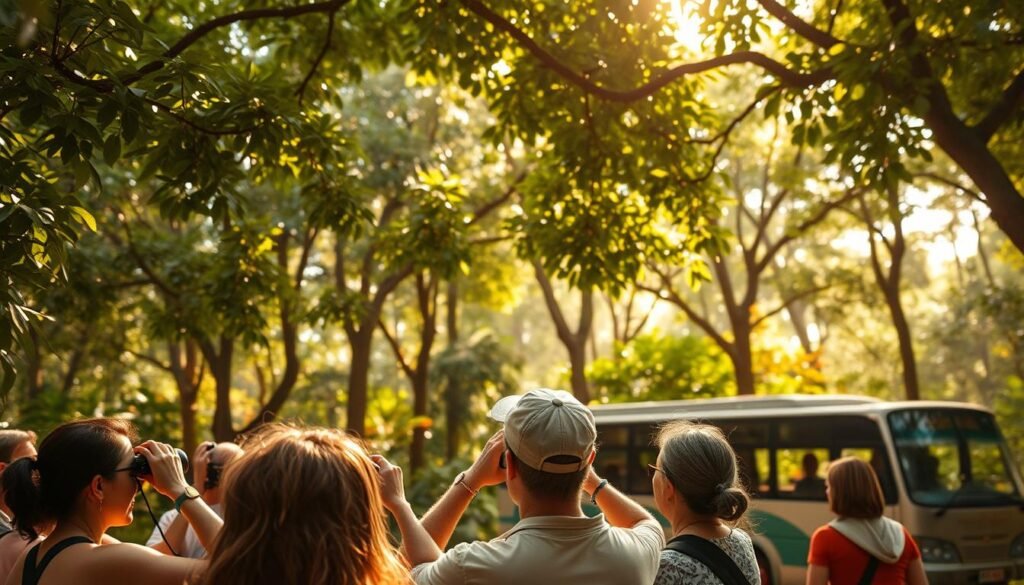
Choosing ecotourism means you’re helping the planet and local people. It’s a way to travel that’s good for everyone.
Top Ecotourism Destinations in the U.S.
The U.S. is a top spot for ecotourism, showing off its natural beauty and helping the environment. More people want to travel in a way that’s good for the planet. This has made ecotourism a big part of the tourism world.
National Parks to Visit
The U.S. has many national parks great for ecotourism. Some of the best are:
- Yellowstone National Park, known for its geothermal features and diverse wildlife.
- Grand Canyon National Park, one of the most iconic natural wonders in the U.S.
- Zion National Park, famous for its red rock canyons and unique rock formations.
- Great Smoky Mountains National Park, renowned for its beautiful mountains and diverse flora.
These parks offer many activities like hiking, camping, and wildlife watching. They also have guided tours, teaching visitors about responsible tourism.
Unique Experiences Offered
Ecotourism in the U.S. is more than just visiting national parks. It’s about exploring the country’s culture and nature. Some special experiences include:
- Kayaking through the bioluminescent bay in Tomales Bay State Park, California.
- Helping with conservation, like protecting sea turtle nesting sites in Florida.
- Visiting indigenous reserves and learning about Native American cultures.
These experiences give travelers amazing memories and help local communities and conservation. They show what sustainable travel is all about.
By visiting these places and taking part in ecotourism, travelers help protect the U.S.’s natural and cultural treasures. This ensures they are here for future generations to enjoy.
How to Choose an Ecotourism Experience
Ecotourism offers many ways to connect with nature. But, it’s key to pick experiences that focus on wildlife preservation. These eco-friendly adventures are exciting and help protect our planet’s beauty.
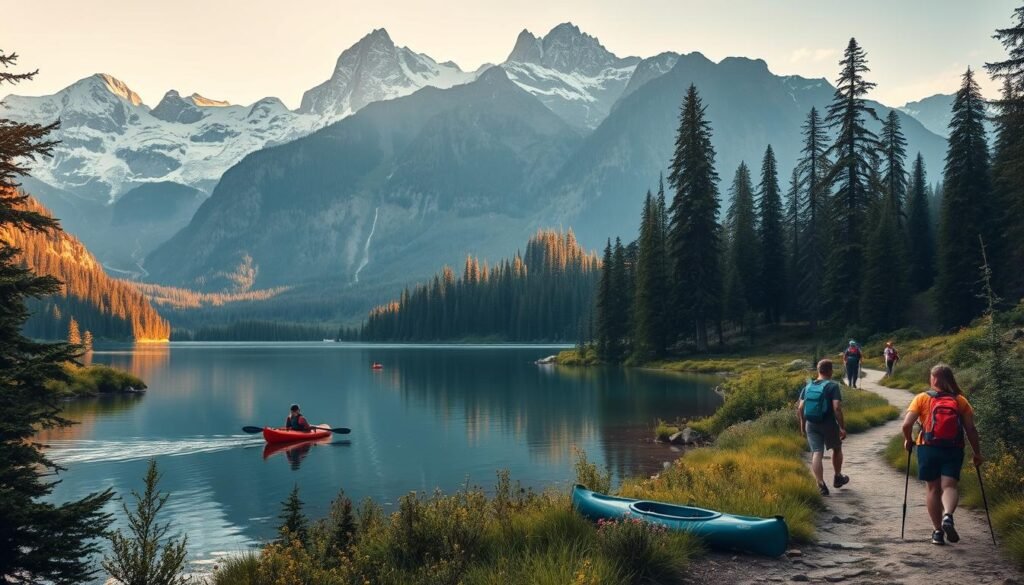
Researching Eco-Friendly Options
When looking for ecotourism, find operators that follow sustainable tourism practices. They should reduce environmental harm, respect local cultures, and support conservation. A conservation expert says, “Good ecotourism helps both the community and the environment.”
“Ecotourism can greatly help conservation, but it needs careful planning and management to work well.”
When checking eco-friendly options, consider these:
- The tour operator’s commitment to conservation
- The level of community involvement and benefit-sharing
- The environmental impact of the tour activities
Questions to Ask Your Tour Operator
Before booking, ask important questions. Some are:
- What conservation efforts does your organization support?
- How do you ensure that your tours minimize environmental impact?
- How do you involve and benefit local communities?
By asking these and doing your homework, you can pick an ecotourism experience. It will be fun and help with wildlife preservation and eco-friendly adventures.
The Role of Local Communities
Community-led ecotourism is changing how we protect nature and the environment. It empowers local communities, making a big difference for both nature and the local economy.
Empowering Indigenous Peoples
Indigenous peoples know their ecosystems well, thanks to generations of living with nature. Ecotourism helps them economically while keeping their culture and knowledge alive.
- Supporting indigenous-led tours and conservation projects
- Promoting cultural exchange programs
- Encouraging the use of traditional knowledge in conservation efforts
By letting indigenous peoples help decide on ecotourism, we make sure conservation is done right and with respect for their culture.
Community-Led Conservation Projects
Community-led conservation projects are key to protecting the environment. They are run by local communities, making sure conservation fits the local environment’s needs.
- Reforestation and habitat restoration
- Wildlife monitoring and conservation
- Sustainable tourism practices
These projects help nature and also help local communities financially, creating a lasting model for ecotourism.
Challenges Facing Ecotourism
Ecotourism is growing, but it faces many challenges. The rise in green tourism brings more visitors to fragile ecosystems. This puts a lot of pressure on local environments and communities.
Over-Tourism Issues
One big problem is over-tourism. Too many visitors can harm the environment and disrupt wildlife. For example, national parks often deal with litter, erosion, and habitat damage because of the crowds.
“The love of nature is a vital part of our national culture, but we must ensure that our enthusiasm does not destroy what we cherish,” said a conservation expert. This shows the importance of sustainable green tourism to keep our natural beauty and support biodiversity conservation.
Balancing Profit with Conservation
Another big challenge is finding a balance between making money and protecting nature. Ecotourism can bring in a lot of money, but it’s important to use this income wisely. It should help with biodiversity conservation and support local communities.
Tour operators and local governments need to work together. They should limit visitor numbers, fund conservation projects, and help local businesses. By finding the right balance, ecotourism can grow and help protect our natural world.
“Ecotourism has the power to help conservation, but it needs careful management. It must benefit both local communities and the environment.”
Innovative Conservation Strategies
Conservation efforts are changing fast with new tech and teamwork. The world faces big environmental problems. We need good, lasting ways to save our planet.
Technology in Conservation
Drone technology helps watch wildlife and fight poaching. Camera traps and sensor technologies also help. They collect data on animals and their homes.
“Technology has changed how we save nature,” says a top conservationist. It helps us make better choices. This is key for ethical tourism, which aims to protect the environment.
Partnerships for Conservation Success
Working together is key for saving nature. Governments, NGOs, local groups, and businesses team up. They share resources and ideas, leading to better results.
- Government agencies provide rules and money.
- NGOs offer special knowledge and connect with communities.
- Local groups share their wisdom and care about saving nature.
- Businesses add money and new tech.
Together, they can do more than alone. As ecotourism and conservation grow, these partnerships will be vital. They help tourism help both the local economy and nature.
“Saving nature is everyone’s job. With teamwork and tech, we can make a big difference in protecting our planet.”
The Future of Ecotourism
More people are now traveling with the planet in mind. This has made the ecotourism industry grow. It’s now focusing on sustainable travel and responsible tourism.
Emerging Trends
New trends are changing ecotourism. These include:
- Increased use of technology to enhance conservation efforts
- Growing demand for immersive, nature-based experiences
- Rise of community-led tourism initiatives
- Greater emphasis on environmental education and awareness
These trends are transforming travel and supporting local communities. For example, technology helps track wildlife and protect habitats. Community-led projects empower locals to manage resources sustainably.
Education and Awareness
Education and awareness are key for ecotourism’s future. Teaching travelers about conservation and their impact helps. This way, ecotourism operators can encourage responsible travel behaviors.
Some ways to improve education and awareness include:
- Creating content about local ecosystems and conservation
- Offering tips on reducing environmental impact
- Working with local communities for culturally sensitive tourism
By using these methods, ecotourism operators can improve the traveler’s experience. They also help protect natural habitats and support local communities.
Getting Involved: How You Can Help
Individual actions can make a big difference. By supporting eco-friendly adventures and wildlife preservation, you help our planet. This leads to a more sustainable future.
Local Conservation Efforts
Supporting local conservation is a great way to help. Groups like the National Wildlife Federation and the World Wildlife Fund have projects. These efforts protect wildlife habitats and encourage eco-friendly practices.
Volunteering in Projects
Volunteering in ecotourism projects is also impactful. Many organizations have volunteer programs for wildlife preservation and education. You get to learn by doing and support conservation.
Every small action matters. By choosing to support conservation and join eco-friendly adventures, you play a key role. You help protect our planet’s precious resources.

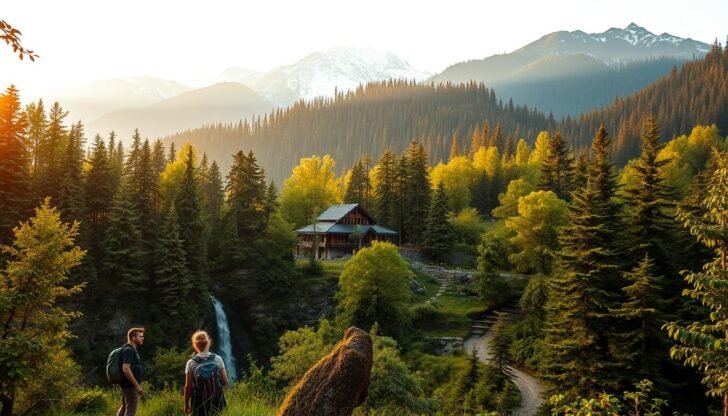

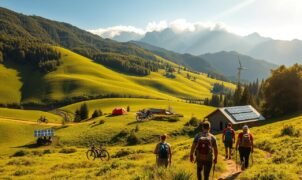
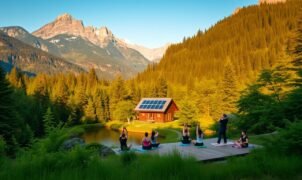
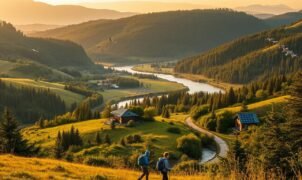











Leave a Reply